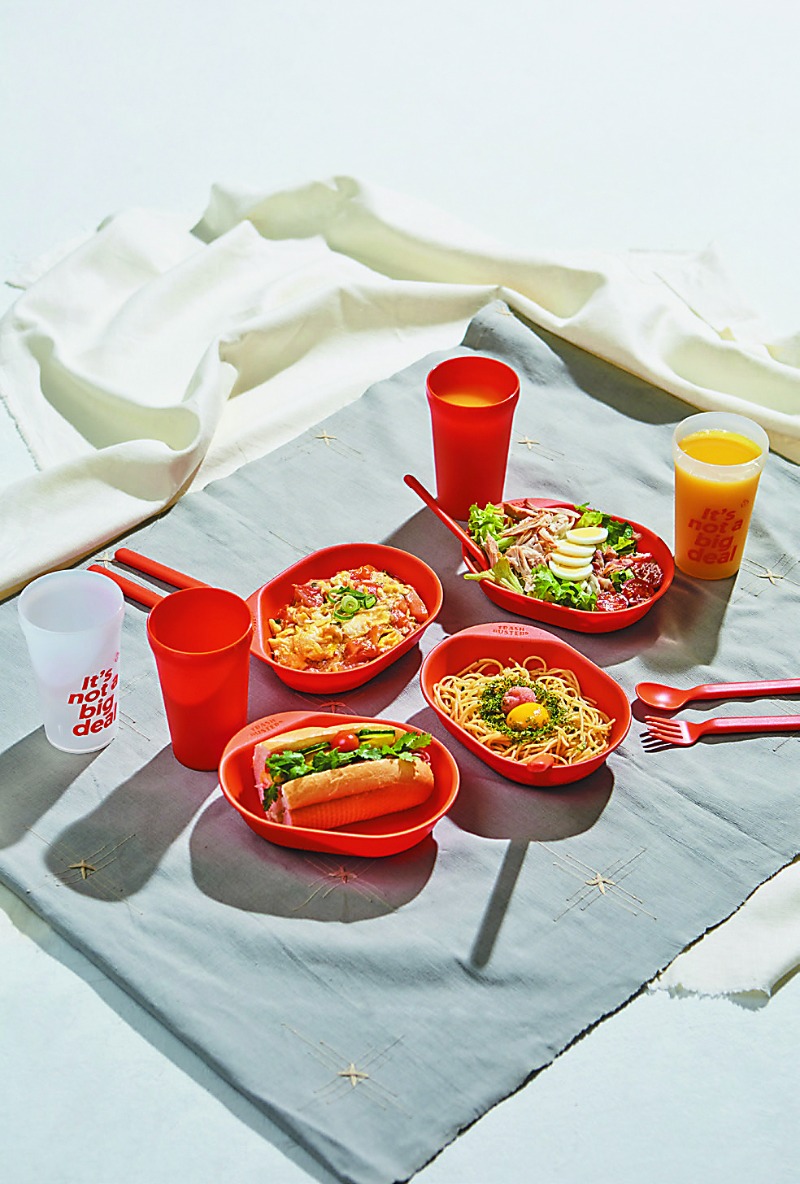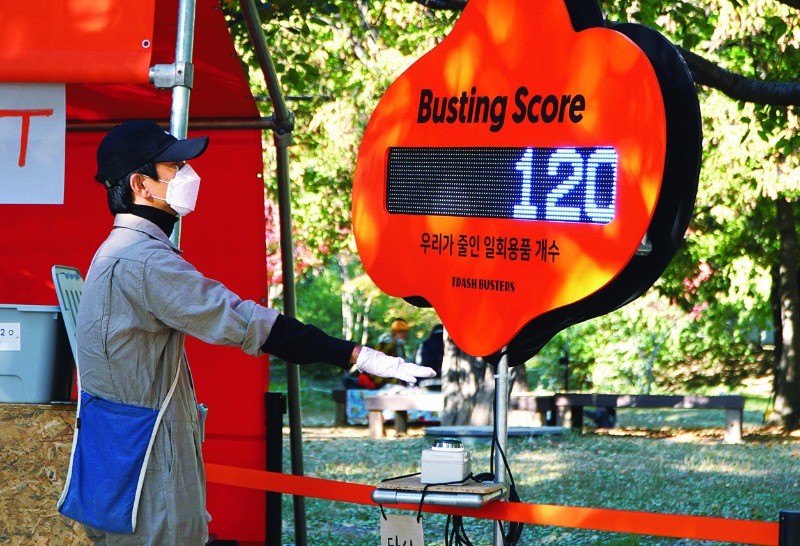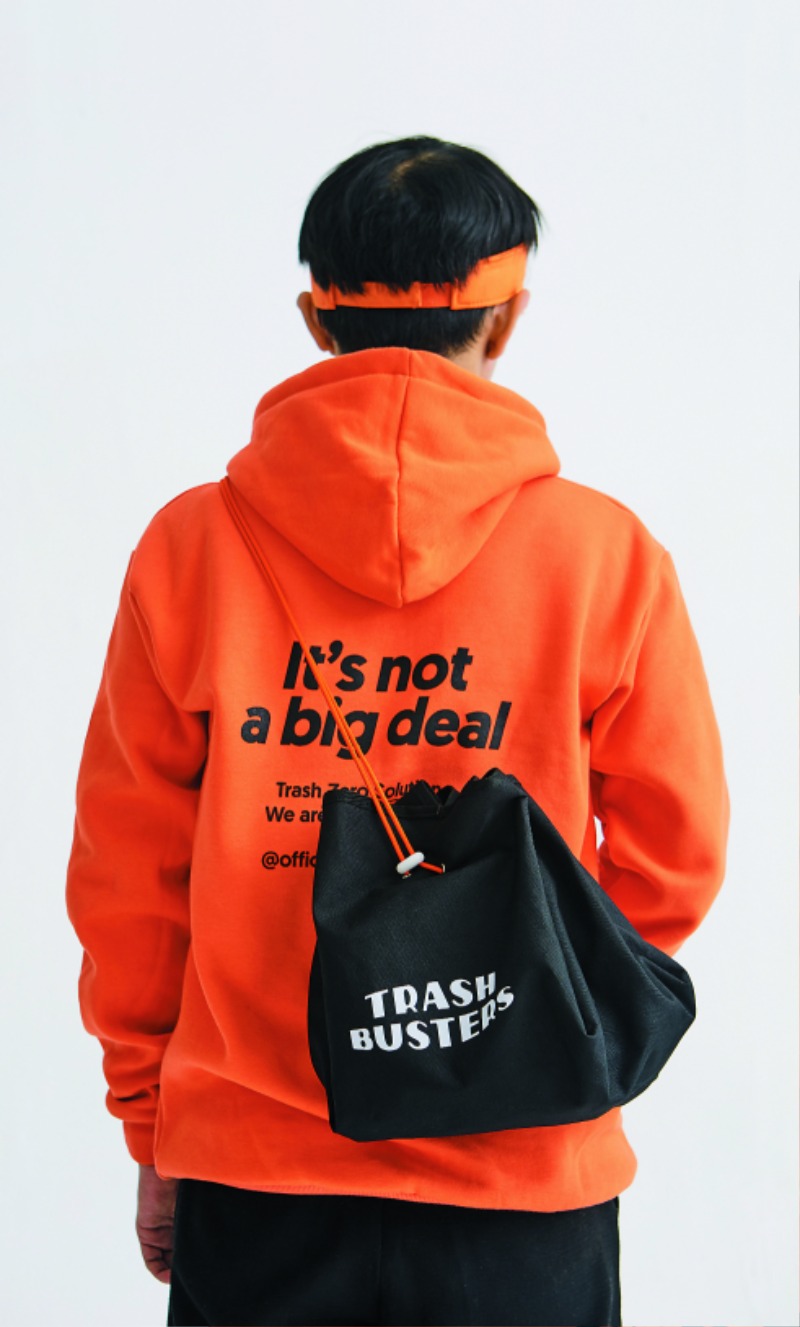Trash Busters don’t despair at the sight of garbage piles. With their impressive push for reusable containers to solve the problem of disposable waste, they have made environmental activism hip and trendy.

Founded in August 2019 with the aim of solving environmental issues caused by single-use plastics, Trash Busters propose a multi-use container rental service as an alternative. Their products include various types of reusable containers, all in the vibrant orange color that has become synonymous with Trash Busters’ message.
© Trash Busters
Accoring to statistics published by the Ministry of Environment and the Korea Environment Corporation, Korea produced 197.38 million tons of waste in 2021. Of the staggering amount of waste generated nationwide each year, disposable products represent the key category that can be effectively reduced. Single-use plastics take years to decompose. During waste treatment, petroleum-based plastics emit strong greenhouse gases such as methane, and when microplastics enter the land and sea, cleanups become impossible. Soil, marine, and air pollution induced by waste are very serious issues. Though washing the dishes may be a chore, if the convenience of disposable products exacerbates the climate crisis, using reusable containers is an “inconvenience” that everyone should be willing to endure.

The Busting Score adds to the fun by having people press the button on the electronic signboard every time they use multi-use containers, showing how many disposable products are being saved.
© Trash Busters
GO TRASH BUSTERS!
Trash Busters go wherever there may be problems with single-use plastics waste — corporate in-house cafes, movie theaters, festivals, event venues, etc. They encourage people to adopt a lifestyle that reduces waste by recycling and reusing.
© Trash Busters
Just as the Ghostbusters chase ghosts, as their name suggests, Trash Busters try to expel trash, namely by visiting festivals, funerals, cafeterias, and other occasions and places where disposable products have become the norm, with the goal of effecting change. The group was launched in 2019 when CEO Kwak Jae-won was planning festivals for the Seoul Metropolitan Government. He vividly recalls the huge piles of garbage left after each event. On average, each festivalgoer used at least three disposable items, with approximately 30,000 of them discarded at the respective festivals. He thought this could be avoided by switching to reusable containers, and the following year, Kwak and his colleagues took action. They decided to lend plastic tableware sets consisting of forks, cups, and bowls to festival visitors and collect them later. Instead of trying to persuade people to voluntarily bring reusable containers, they took the initiative to provide and collect tableware themselves. A washing system that allows the reuse of their tableware would drastically reduce single-use waste.
Kwak’s conviction impressed several partners, and he had a chance to try out the reusable container rental service for the first time at Seoul Soldout, a music festival popular with young fans, held in the summer of 2019. Trash Busters’ efforts yielded significant results. The amount of garbage was reduced by 98 percent compared to the previous year, making it a near waste-free event.
ECO BECOMES HIP
Unaccustomed to paying a returnable deposit to rent eating utensils, visitors were initially confused. However, many agreed that the change benefited all involved and was essential in our time. Today, thanks to greater environmental awareness among consumers and wider acceptance of reusable containers, people freely borrow and return plastic containers, often without the need for a deposit system.
Thanks to Trash Busters’ consideration of users’ experience, the cause resonated with many and resulted in impressive engagement. The reusable items were carefully thought out in terms of the place and ambience in which they were used; they included containers designed to hold various types of food, cup holders attached to a lanyard for ease of carrying, and pouches that could be unfolded and used as mats.
Trash Busters use a vivid orange color that elicits a positive mood, and the cheerful symbol parodying the movie “Ghostbusters” works well with the festival scene. The on-site staff wear overalls bearing the slogan “It’s not a big deal.” Here, once again, the Trash Busters’ cool and resolute attitude is evident. Of particular note is their avoidance of somewhat clichéd keywords, such as “eco,” “green,” and “eco-friendly.”
This has helped Trash Busters successfully take charge at events and venues popular with fun-loving visitors, from The Air House, a hip and somewhat mysterious underground music festival, to the Incheon Pentaport Rock Festival, Korea’s largest outdoor rock festival, and Melody Bar Echo, a cozy LP bar in Samgakji, Seoul. A brand’s perception may change depending on the consumer and the place of consumption, but Trash Busters has truly managed to become a hip brand in the era of climate crisis.
REUSABLE CONTAINERS IN EVERYDAY LIFE

Trash Busters claim that once a comprehensive system of collecting, washing, and renting out multi-use containers is set up, it will no longer be a big deal to stay away from single-use products. The catchphrase ‘It’s not a big deal’ encourages people to take a lighter, less solemn approach to environmental issues.
© Trash Busters
Trash Busters’ work is not confined to festivals. Right after their launch, they began working with clients in different fields, such as corporate in-house cafés, event sites, soccer stadiums, and movie theaters. Over the past three years, many festivals were canceled due to the COVID-19 pandemic, but this has not stopped Trash Busters from pursuing their goal in new areas.
With the wide adoption of ESG (environmental, social, and corporate governance) strategies by many organizations, the number of Trash Busters’ in-house café clients has more than doubled within a year. The rental business scale may be far smaller than at festivals, but it is no less meaningful; such cafés consistently showcase their activities to the public, capitalizing on the opportunity to make reusable containers the more frequently used option as opposed to disposable ones. Reusable containers have become price-competitive thanks to industry actively embracing technologies that enable automated washing and hygienic reuse. Hence, using Trash Busters’ services is now the natural choice. The reusable container system is both rational and attractive and brings further changes.
Among these changes, it is particularly noteworthy that Seoul has enacted an ordinance banning the use of disposable products at events hosted by the Seoul Metropolitan Government. This highlights that the movement toward reducing disposables and wisely reusing resources in the private sector is now in sync with society.
BUSTING CYNICISM
When it comes to discussing environmental and climate issues, certain individuals resort to cynicism and toxic attitudes. American activist and writer Rebecca Solnit, who since the 1980s has fought for causes including environmental protection, the antinuclear movement, and human rights, defines such people’s mindset as “naïve cynicism,” noting that they use bad data to make claims about future inevitabilities, present impossibilities, and past failures. In her words, “It bleeds the sense of possibility and maybe the sense of responsibility out of people.”
In order to combat this, Trash Busters’ call to action is now essential: “It’s not a big deal!” This powerful, provocative slogan aims to convince people that the garbage problem is not too difficult to solve. Rebecca Solnit presents a message that ref lects this sentiment, namely that we should never give up, even if we feel helpless, and should actively respond to the challenges of our time.
Despite the passing of a law that prevents the use of disposable items in cafés, paper cups are still used, and some venues stack two paper cups instead of using cup holders. Not only are delivery meal containers becoming increasingly diverse, we are now in an era where almost any product imaginable can be delivered, creating ever greater amounts of packaging waste. Although the use of plastic bags has been banned in Korean supermarkets, most fruits and vegetables still come in individual plastic packaging. It is tempting to think cynically, but this simply underlines the importance of Trash Busters and their work. It is also crucial to remember that the fight is not just against waste, but also against the negative attitudes that discourage people from active participation and hamper effective change.
Yoo Da-mi Writer